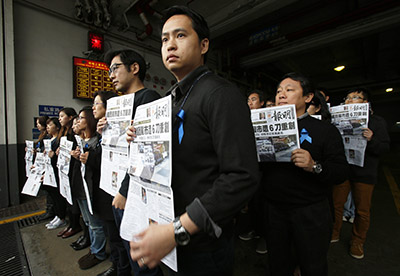Chinese journalist Liu Jianfeng crowdsources his funding
Last July, veteran Chinese journalist Liu Jianfeng posted an announcement on the Chinese microblog Weibo, confirming his intention to become an independent investigator and writer. In a country where all media remains state-owned, Liu’s plan was a bold one. He promised to produce four to six independent, investigative stories in the coming year, and to…

Journalists in Hong Kong and China: see our security guide
CPJ’s Journalist Security Guide is now available in Chinese (PDF). The guide has been available in other languages for more than a year but, frankly, we didn’t see a Chinese version as a priority. Last year, after a university professor in China asked if he could translate some sections for his class, we began working…
Tougher tactics emerge in China’s media crackdown
Late in 2013, Time’s Hannah Beech posted a great blog on the magazine’s website around the time that about 24 foreign journalists were worried that the visas allowing them to work in China might not be approved: “Foreign Correspondents in China Do Not Censor Themselves to Get Visas,” she told readers. She’s right, of course,…
Covering China goes far beyond the current visa woes
Everyone agreed at the panel discussion I took part in yesterday in Washington that the fate of about two dozen journalists working for The New York Times and Bloomberg News in China is unresolved. No one knows what will happen by the ostensible deadline of midnight, December 31, 2013, for their expulsion. I say ostensible,…
Journalists can help curb gender-based violence
Training journalists how to better cover gender-based violence can help challenge attitudes that foster sexual attacks. Helping journalists learn personal skills to safely navigate sexual aggression can help prevent them from becoming victims themselves.
Q&A: Paul Mooney on reporting in China
I’ve known Paul Mooney since we worked together at Time Warner’s Hong Kong-based magazine Asiaweek, which closed in December 2001. After that we’d overlapped in Beijing for several stints. A lot has been written about China’s refusal to give him a visa to let him go back to Beijing to work as a features writer…
In China: Who, and what, to believe?
The New Express’s campaign to get Chen Yongzhou, 27, released from police detention last week attracted international attention, including CPJ’s. Chen had been picked up October 18 on “suspicion of damaging commercial reputation” with a series of stores alleging financial mismanagement and corruption at Zoomlion Heavy Industry Science and Technology Co., China’s second-largest heavy equipment…
Is China silencing rumors, or the public?
China’s Internet has changed fundamentally since Shi Tao was given a 10-year prison sentence in 2005. Shi’s case was a marker of sorts— the first high profile sentencing in China for online activity. The government says 40 percent of the population is online as of December 2012. That’s 564 million people. In 2005, penetration was…
